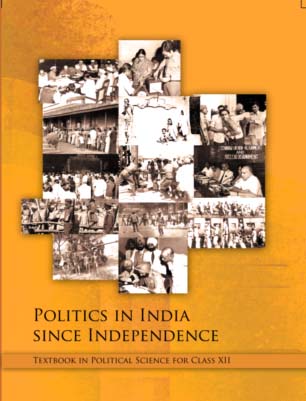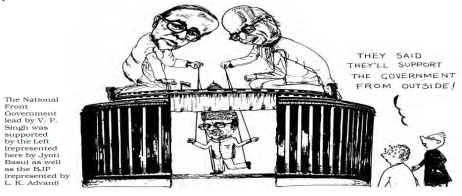CBSE Question Paper 2009 Class 12 Political Science conducted by Central Board of Secondary Education, New Delhi in the month of March 2009. CBSE previous year question papers with the solution are available in the myCBSEguide mobile app and website. The Best CBSE App for students and teachers is myCBSEguide which provides complete study material and practice papers to CBSE schools in India and abroad.
CBSE Question Paper 2009 Class 12 Political Science

Class 12 Political Science list of chapters
Part A – Contemporary World Politics
- The Cold War Era
- The End of Bipolarity
- US Hegemony in World Politics
- Alternative Centres of Power
- Contemporary South Asia
- International Organisations
- Security in the Contemporary World
- Environment and Natural Resources
- Globalization
Part B – Politics In India Since Independence
- Challenges of nation building
- An era of one-party dominance
- Politics of planned development
- India’s external relations
- Challenges to and restoration of the Congress system
- The crisis of democratic order
- The rise of popular movements
- Regional aspirations
- Recent developments in Indian politics
CBSE Question Paper 2009 Class 12 Political Science
General Instruction:
- All questions in both the section are compulsory.
- Question numbers 1 to 10 are of one mark each. The answers to these questions should not exceed 20 words each.
- Question numbers 11 to 20 are of two marks each. The answers to these questions should not exceed 40words each.
- Question numbers 21 to 30 are of four marks each. The answers to these questions should not exceed 100 words each.
- Question numbers 31 to 35 are of six marks each. The answers to these questions should not exceed 150 words each
Q1. Name the member countries of SAARC.
Q2. What is meant by US hegemony in world politics?
Q3. What is the basic difference between the ‘traditional’ and ‘non – traditional’ concepts of security?
Q4. What is the ‘Amnesty International’ responsible for?
Q5. How far is it correct to say that globalization results in the erosion of the State sovereignty?
Q6. Why should the ‘environmental concerns’ be part of the contemporary global politics?
Q7. Which theory was behind the partition of India in 1947?
Q8. Who was P.C. Mahalanobis?
Q9. Why did India not join either NATO or SEATO?
Q10. Give the full forms of the NPT and CTBT.
Q11. What is meant by unipolarity and bipolarity?
Q12. What are the economic consequences of globalization?
Q13. What led to the formation of the European Union?
Q14. Why is the fall of the Berlin Wall in 1989 treated as the end of bipolarity?
Q15. How can we protect the right of the indigenous people with regard to the environment?
Q16. How has the method of voting changed from the first General Election of 1952 to the General Election of 2004?
Q17. Mention the role of Sardar Vallabhbhai Patel towards India’s integration.
Q18. ‘Regionalism does not imply separatism.’ Explain.
Q19. Why did Dalai Lama seek refuge in India?
Q20. Mention the causes of ‘Kargil Conflict.’
Q21. The study has given the map of the world and answer the following questions in your Answer Book.
(a) Identify and name the countries marked A, B, C, and D respectively.
(b) Write the names of the following U.N. Secretary Generals with the names of the countries they belonged to.
(1) Dag Hammarskjöld
(2) Kurt Waldheim
(3) Boutros – Ghali
(4) Kofi A. Annan
WORLD POLITICAL MAP
For Blind Candidates only in lieu of Q. No. 21:
Answer the following questions:
(a) Name the countries to which the following U.N. Secretary Generals belong:
(1) Boutros – Ghali
(2) Kofi A. Annan
(3) Kurt Waldheim
(4) Dag Hammarskjöld
(b) Who was the first Secretary General of the United Nations?
Q22. ‘India’s policy of non – alignment has been criticized or being ‘inconsistent’ and ‘unprincipled”.
Do you agree with this view? Why?
Q23. What are the reasons behind the rise of international terrorism?
Q24. The phrase ‘Aaya Ram, Gaya Ram’ signifies which concept? Explain its impact on the Indian
political system.
Q25. How did the outcome of 1971 elections help in the restoration of Congress?
Q26. What is meant by ‘Common, but differential responsibilities’ in relation to the environment?
Q27.
Look at the cartoon given above carefully and answer the following questions:
(a) Does the cartoon refer to a puppet government?
(b) Describe the role of such a government in the Indian democratic setup.
(c) What is meant by ‘Support the Government from outside’?
For Blind Candidates only in lieu of Question No. 27:
Answer the following questions:
(a) What is a coalition government?
(b) What role does it play in the Indian democratic setup?
(c) What is meant by ‘support the government from outside?
Q28. How did the prevalence of ‘one-party dominance system’ adversely affect the democratic nature of Indian politics?
Q29. ‘In the new era of coalition politics, political parties are not aligning on the basis of ideology.’ Explain.
Q30. Explain the rise of political violence in the North – Eastern part of India.
Q31. What is meant by ‘Shock Therapy’? Assess its consequences on the post-communist regimes
OR
Examine India’s relationship with the former Soviet Union during the Cold War. [6]
Q32. What important lessons can be drawn for Indian Democracy from the declaration of the Emergency of June 25, 1975?
OR
Highlight the legacy of Janta Government which came into power after the end of the Emergency of 1975 – 77.
Q33. Explain the factors responsible for the rise of the Chinese economy.
OR
Explain the vision of the ASEAN for 2020.
Q34. What are the constraints on American hegemony today? Which one of these, do you expect, to be more important in the future?
OR
Assess the New World Order which emerged after the collapse of the Soviet Union.
Q35. Explain any three challenges for nation building faced by India at the time of its independence.
OR
Answers the following questions based upon the Presidential address of Mohammad Ali Jinnah at Karachi on August 11, 1947:
“We should begin to work in that spirit and in course of time all these angularities of the majority and minority communities, the Hindu community and the Muslim community – because even as regards Muslims you have Pathans, Punjabis, Shias, Sunnis and so on and among the Hindu you have Brahmins, Vaishnavas, Khatris, also Bengalis, Madrasis and so on – will vanish…. You are free; you are free to go to your temples, you are free to go to your mosques or to any other place of worship in this State of Pakistan. You may belong to any religion or caste or creed – that has nothing to do with the business of the State.”
(a) Do you think that Jinnah’s statement contradicts the theory which was the basis of the creation of Pakistan? Justify your answer.
(b) What is the essence of Jinnah’s statement in this passage?
(c) To what extent did Pakistan live up to Jinnah’s expectations in this passage?
These are questions only. To view and download complete question paper with solution install myCBSEguide App from google play store or log in to our student dashboard.
Last Year Question Paper Class 12 Political Science 2009
Download class 12 Political question paper with the solution from best CBSE App the myCBSEguide. CBSE class 12 Political Science question paper 2009 in PDF format with the solution will help you to understand the latest question paper pattern and marking scheme of the CBSE board examination. You will get to know the difficulty level of the question paper.
Previous Year Question Paper for class 12 in PDF
CBSE question papers 2018, 2017, 2016, 2015, 2014, 2013, 2012, 2011, 2010, 2009, 2008, 2007, 2006, 2005 and so on for all the subjects are available under this download link. Practicing real question paper certainly helps students to get confidence and improve performance in weak areas.
- Physics
- Chemistry
- Mathematics
- Biology
- Accountancy
- Business Studies
- Economics
- Geography
- Physical Education
- Computer Science
- Informatics Practices
- English Core
- Hindi Core
- Hindi Elective
- Other Subjects
To download CBSE Question Paper class 12 Accountancy, Chemistry, Physics, History, Political Science, Economics, Geography, Computer Science, Home Science, Accountancy, Business Studies, and Home Science; do check myCBSEguide app or website. myCBSEguide provides sample papers with solution, test papers for chapter-wise practice, NCERT solutions, NCERT Exemplar solutions, quick revision notes for ready reference, CBSE guess papers and CBSE important question papers. Sample Paper all are made available through the best app for CBSE students and myCBSEguide website.

Test Generator
Create question paper PDF and online tests with your own name & logo in minutes.
Create Now
Learn8 App
Practice unlimited questions for Entrance tests & government job exams at ₹99 only
Install Now